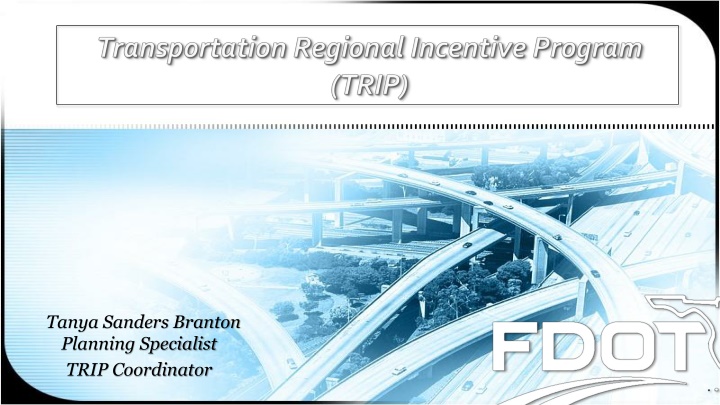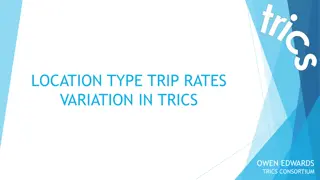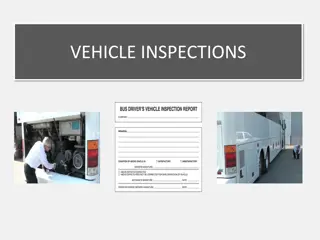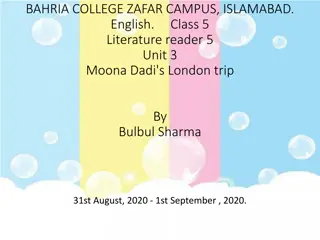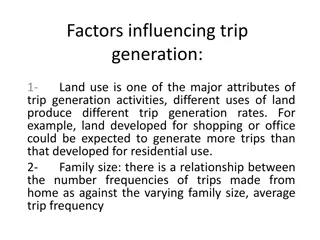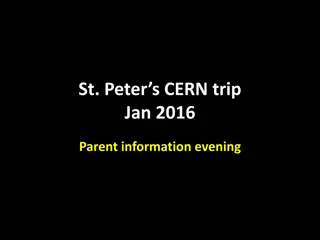The TRIP Program
The TRIP Program offers funding to enhance regionally significant transportation facilities in Florida. Eligible participants include MPOs, counties, and multi-county authorities forming partnerships. Regional partners must develop an interlocal agreement outlining responsibilities such as regional transportation planning, area boundaries, agreement duration, dispute resolution process, and project requirements.
Download Presentation

Please find below an Image/Link to download the presentation.
The content on the website is provided AS IS for your information and personal use only. It may not be sold, licensed, or shared on other websites without obtaining consent from the author.If you encounter any issues during the download, it is possible that the publisher has removed the file from their server.
You are allowed to download the files provided on this website for personal or commercial use, subject to the condition that they are used lawfully. All files are the property of their respective owners.
The content on the website is provided AS IS for your information and personal use only. It may not be sold, licensed, or shared on other websites without obtaining consent from the author.
E N D
Presentation Transcript
Tanya Sanders Branton Planning Specialist TRIP Coordinator
What is TRIP? The TRIP Program provides funding to improve regionally significant transportation facilities in regional transportation areas defined by Florida Statute 339.2819. The purpose of the programing is to encourage regional planning by providing state matching (50/50) funds for improvements to facilities that function as part of an integrated national, statewide, or regional transportation system. Funds are allocated to Districts as specified in Florida Statute 201.15 to the State Transportation Trust Fund. Applicants for TRIP funding must provide matching 50% or more and, if required, execute an interlocal agreement to ensure that TRIP funding will be exclusively used to improve facilities identified in the capital improvement element of a comprehensive plan that has been determined to be in compliant with Chapter 163, Part II, F.S.
Definition of REGIONAL: A transportation project that is on a facility which serves regional transportation needs (such as access to and from the area outside of the region, major activity centers in the region, major planned developments such as new retail malls, sports complexes, etc., or transportation terminals) and would normally be included in the modeling of a TPO area transportation network, including at a minimum all principal arterial highways and all fixed guideway transit facilities that offer an alternative to regional highway travel.
Who is eligible to participate? All MPOs, Counties, and Multi-County Transportation Authorities are eligible to participate, if they form partnerships. MPOs comprised of three or more counties Two or more contiguous MPOs One or more MPO and one or more contiguous counties that are not MPO members Two or more contiguous counties that are not MPO members A multi-county regional transportation authority created by or pursuant to law
What are the responsibilities of the Partners? Regional partners must develop an interlocal agreement that provides the following: Includes development of the regional transportation plan; Delineates the boundaries of the regional transportation area; Provides the duration of the agreement and how it may be changed; Describes the planning process, and defines a dispute resolution process.
Project requirements for TRIP funding Must support facilities that Serve national, statewide or regional functions Project must serve a regional need and the transportation facility must be noted within the RTA s plan and map. Function as an integrated regional system Must be supported by local planning efforts: Identified in Capital Improvement Element in the appropriate local government comprehensive plan; Project must be in compliance with the area TPO plans, Be in compliance with local corridor management policies within the comprehensive plan. Must be consistent with the Strategic Intermodal System; example: adding capacity Must have a commitment of local, regional or private matching funds, unless eligible for a match waiver.
Project PRIORITY outline (F.S. 339-2819) Provide connectivity to the Strategic Intermodal System Support economic development and goods movement in rural areas of economic opportunity (RAO), Are subject to local ordinances that establish corridor management techniques, Improve connectivity between military installations and the Strategic Highway Network (STRAHNET) or the Strategic Rail Corridor Network (STRACNET), and The extent to which local matching funds are available to be committed to the project.
Work Program Development Cycle Standard Cycle Accelerated Cycle JULY JULY Final Adoption of Work Program (AD) Final Adoption of Work Program (AD) System opens for tentative activities (G1) System opens for Tentative activities (G1) APRIL-JUNE AUGUST FEBRUARY-JUNE AUGUST-OCTOBER Address concerns and make final decisions Assimilation of the Tentative Work Program (G1) Address concerns and make final decisions Assimilation of the Tentative Work Program (G1) MARCH SEPTEMBER JANUARY NOVEMBER Statewide Public Hearing System closes to balance the Statewide Public Hearing System closes to balance the Tentative Work Program (G1) Legislature Convenes Tentative (G1) Legislature Convenes FEBRUARY DECEMBER OCTOBER Central Office submits Tentative to Governor s Office & Legislature Central Office submits Tentative (G1) to Governor s Office & Legislature DECEMBER Hold Work Program E-Public Hearing & present Tentative (G1) to the TPO s NOVEMBER JANUARY Hold Work Program E- Public Hearing & present tentative to the TPO s Secretary Review by Central Office & Florida Transportation Commission Assessment Secretary Review by Central Office & Florida Transportation Commission Assessment
FY 2024/25 2028/29 Development Cycle Emerald Coast Regional Council Jill Nobles 850-332-7976, ext. 212 Jill.Nobles@ecrc.org Capital Regional Planning Council Greg Burke, AICP 850-891-8626 Greg.burke@talgov.com
GAP (Grant Application Process) System 2/23/2023 2022 The Implementing Agency will need to submit and upload all requested information in the GAP system.
Can a project be submitted for TRIP funds that does not originate from a Regional Transportation Plan? No. The project must come from an approved Regional Transportation Plan. What does it mean for a project to be "consistent with the Strategic Intermodal System Plan"? Frequently Asked Questions Being consistent with the SIS means that the project serves a national, statewide, or regional function, and it serves an integral part of an interconnected regional network. If an eligible rural county is granted a waiver or reduction for its share of the non-TRIP match of project costs, can TRIP funds be used to cover the balance? In those instances where a match has been waived or reduced, the scope of the project will have to be reduced. Who decides what is regionally significant and what are the criteria? Regional transportation areas designate regionally significant facilities. The definition of "regionally significant" is expected to vary according to the characteristics and policies of each region. FDOT has provided guidance for these designations and identified characteristics for consideration. This information can be found within the resources webpage.
Tanya Sanders Branton D3 TRIP Coordinator 850-330-1550 Tanya.Branton@dot.state.fl.us Lorraine Moyle State Local Programs Administrator (850) 414-4383 Lorraine.Moyle@dot.state.fl.us https://nwflroads.com/planning https://www.fdot.gov/programmanagement/LP/TRIP/Default.shtm
